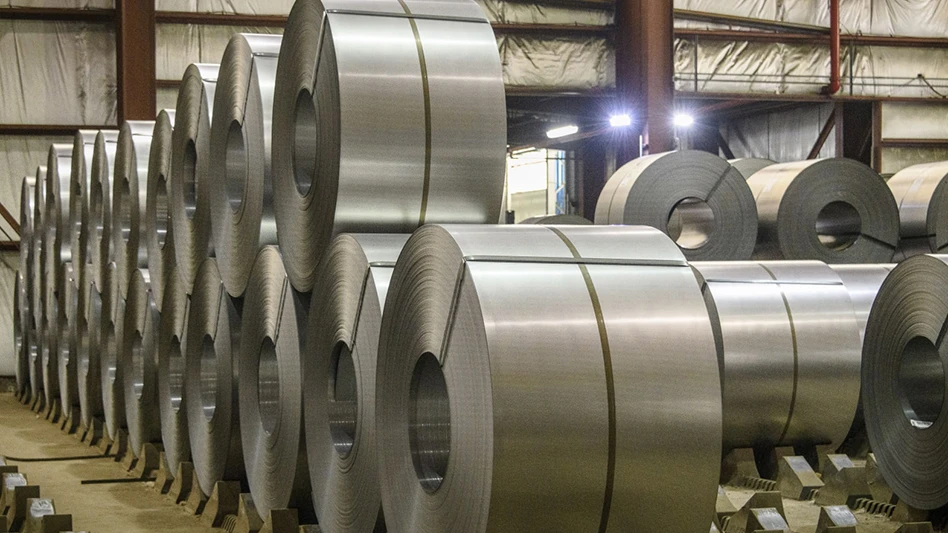 Steve Sutta |
S
teve Sutta knows what happens to recycling companies that aren’t prepared for market downturns: They tend to disappear. In his 30 years in the recycling business, Steve, the president of The Sutta Co., Oakland, Calif., has seen quite a few of his competitors close up shop during a pricing slump and he wants to prevent his company from becoming one of the victims.To avoid a similar fate, Steve concentrates on growing his company when an opportunity presents itself. He also focuses on keeping operating costs lean and productivity high. "I’m really stubborn," he says. "I’ve been willing to cut costs. One of our goals is to be the low-cost processor in any market we enter."
GETTING ESTABLISHED
Steve has been working in the recycling industry since 1975, when he co-founded a paper recycling plant that he eventually sold to Weyerhaeuser.

His commitment to the environment is what led him to choose a career in the paper recycling industry. "I wanted to save trees," he says. "I had an environmental bent 30 years ago and wanted to run a business and preferred to do something worthwhile and good for the environment."
That environmental bent has grown into a thriving business. Today, The Sutta Co. employs 150 people and operates plants in six locations—including two document destruction facilities—processing 30,000 tons of paper monthly.
Steve says the expansion outside of Oakland was not part of a master plan, but based on identified opportunities. "The expansions to both Reno and Oxnard came out of specific opportunities," he says.
The material the company processes comes largely from industrial and office accounts. The Sutta Co. has decided not to tap into the residential curbside fiber stream.
"I don’t view someone who is in curbside as my competitor," Steve says. "They’re addressing 20 percent of the market; I’m addressing the other 80 percent."
Instead, Steve says the company has worked on solidifying relationships with large-volume generators. "We’ve really tried to understand what our suppliers’ needs are and, then, to put together custom systems for large bulk generators of scrap paper."
Such solutions can include compactors or balers on site at generation points, Steve says. "Our goal is to try to streamline our suppliers’ waste handling systems. We reduce their operating costs and our handling costs."
Custom programs can also be more technical for printers and other large generators. "We’ve been very successful with the generators in terms of designing material handling systems; proprietary equipment that lowers their cost. That’s really at the heart of providing value to them," he says.
"We’ve helped them design systems with conveyors and dryer systems, sludge presses, shredders: what ever is cost effective for the situation," Steve continues. "The custom systems are designed specifically for the generators, and sometimes include collecting plastics, metals, pallets and other materials. We have an engineer in house and two or three people on the sourcing side who can suggest what will work." One noteworthy case involved helping design a $600,000 air system for a corrugated plant.
| Upgrade Helps Contain Costs |
|
When Steve Sutta decided to purchase a new high-volume baler for his company, he realized he had not bought a major piece of equipment in 10 years. The president of The Sutta Co., headquartered in Oakland, Calif., visited seven scrap paper dealers in and near Tokyo, Japan, in a four-day span to research equipment. "We vetted the six or seven manufacturers of the equipment we saw and narrowed the field down to three potential suppliers," says Steve. At that point, the Macpresse from Sierra International Machinery was still one of several possible candidates being considered. After seeing an installation in Texas, however, Steve made up his mind. "It turned out to be No. 1 in performance, design and price," he says. For a company with six operating sites that process 30,000 tons of paper combined per month, controlling costs is a big concern. Steve says that collection costs are escalating; competition is squeezing margins; insurance costs are skyrocketing; and labor costs are increasing. With the Macpresse, though, he’s been able to control overtime costs. The unit will process 32 tons of OCC per hour and 60 tons of news grades per hour. After only three months of operation, Steve was contemplating buying a second Macpresse to keep up with production needs. "My goal is to be the lowest cost provider in any market I’m in," he says. He estimates the Macpresse will deliver a full return on investment in 14 to 16 months. Sutta credits Terry Mohr and Richard Harris of Sierra with assisting him in the latest stage of his company’s progress. Having spent 30 years in the industry, Steve made his decision carefully based on experience. "Everything’s been terrific. The Macpresse is just amazing. I’m very happy that I bought it," Steve confirms. |
The Sutta Co.’s devotion to keeping its customer’s happy ensures that material keeps flowing into the company’s plants. Once it’s there, Steve focuses on production efficiencies that can help to keep The Sutta Co. in the black.
EYEING THE LEDGER
Steve’s goal of being the lowest-cost operator is critical to competing in the industry during pricing troughs and to thriving when margins are more comfortable. No matter what price paper might be selling at, Steve says margins are tighter and "price compression between the grades" means packers always have to watch the bottom line.
"We focus on costs," he says. "We try and run the most cost-effective equipment and we buy a lot of used equipment. I’ve also got talented people on the operations side at each of the locations," he adds.
Another key to how The Sutta Co. works is "simplified operations," Steve says. The company tries to maintain a lean staff and collects paper and prepares grades in ways that will minimize the need to sort mechanically or manually.
Steve also tried not to assume too much debt while growing The Sutta Co. "Why add new capacity so you can suffer debt payments? You’ve got to avoid burdensome debt," he says.
STAYING GOLDEN
With a strategy in place to please customers and to move material quickly, one of the remaining keys for The Sutta Co. is partly beyond its control: the future of industrial scrap paper generation in California.
Despite some industrial facilities moving away from California’s heavily regulated climate and into Nevada and Arizona, Steve says there are still generators to tap into. "In California, there is still a nice bulk of customers in some segments," he says. "There are still printers and a lot of fruit growers and food processors. The agricultural business is huge in California. That’s really a base of business here—the boxes and labels used in agribusiness."
However, Steve concedes that the regulatory climate in California can be limiting. "The regulatory climate is not good. Land and labor costs are extreme. If I didn’t own my land, I’d be in trouble."

Despite the forces that are causing some companies to relocate, people are still drawn to the state. "Our focus is California. The population is probably going to grow by another 50 percent over the next five, 10 years," Steve says.
On the consuming side, Asian markets figure more prominently now than they did when the company began in 1984. "From my Oakland plant, more than half my cargo goes offshore," Steve says. Contrarily, product from the Reno, Nev., plant stays almost entirely within the United States.
The Sutta Co. continues to prepare it for any and all circumstances. "We decided we could no longer afford to work with outside haulers. We went out in what at the time was a difficult paper market and bought about 12 trucks and reduced our costs. It has taken up a lot of management time and focus, but it’s all part of keeping costs down," Steve says.
The company also deals in materials in addition to paper. "We move 200 to 300 tons of plastic per month," he says, "and some metal, for those generators who want one-stop shopping."
It’s all a part of staying competitive and remaining alive, Steve says. "I think that everyone who is in this business will have to look at their costs and figure out how to reduce them."

Explore the April 2005 Issue
Check out more from this issue and find your next story to read.
Latest from Recycling Today
- Fitch Ratings sees reasons for steel optimism in 2025
- P+PB adds new board members
- BlueScope, BHP & Rio Tinto select site for electric smelting furnace pilot plant
- Magnomer joins Canada Plastics Pact
- Out of touch with reality
- Electra names new CFO
- WM of Pennsylvania awarded RNG vehicle funding
- Nucor receives West Virginia funding assist





